- Home
- Diana Lopez
Lucky Luna Page 8
Lucky Luna Read online
Page 8
“I’m better at volleyball,” I explain.
Then recess is over and we head back to class. When Mr. Cruz says it’s time for math, I say, “¡Chale!” A few kids giggle, but he doesn’t look pleased at all.
When he hands out a worksheet and takes forever to get to my row, I say, “Dale shine.” He raises an eyebrow, questioning me, so I use the other word for “hurry.” “¡Ándale!” His eyebrow stays up, and I wonder if he knows what “dale shine” and “ándale” mean.
When he catches Ryan doodling instead of doing his work, I say, “Hey, Ryan, quit being a vato barrato.” A bunch of kids laugh, but Mr. Cruz gets a stern look on his face. Before he can scold us, I say, “Juega la fría, my friends.” But they don’t play it cool. They laugh even louder.
Mr. Cruz says, “Luna, maybe you can work quietly now.”
He hasn’t raised his voice, but I can tell he’s mad. Claudia’s shaking her head, which means she’s going to tell my mom for sure. I’m trying my best to be good—I’m even speaking Spanish when I don’t have to!—but for some reason, I’m still in all kinds of trouble.
One of the easiest Spanish words to learn is “problema.” It means problem. Basically, it’s an English word with an “a” stuck at the end. In Texas, lots of people stick an “o” at the end instead because they like to say “no problemo.” I wish we could do that with all Spanish words. Then “desk” would be “desk-o” and a Snickers bar would be “Snickers-o” and “Give me a break” would be “Dame un break-o.” I should be glad that some Spanish words sound like English because there are languages—Japanese, Greek, and Tagalog—that don’t sound close to English at all.
The reason I’m thinking about having a problema is because as soon as I get home, Mom asks me to sit down. Then she takes a seat beside me and says, “I heard you had an interesting day.”
Sometimes “interesting” means “fascinating,” but other times, it means “weird.” So I’m trying to figure out if my day was fascinating or weird, but as far as I can tell, it was just a regular day. So why would Mom ask about a regular day? And why would she ask me to sit as if she’s about to share terrible news and is worried I’ll faint from the shock? And what does she mean by “I heard”?
“Heard? From who?” I ask. Then I figure it out. “Did Claudia squeal again? When did she have time? I thought she had Needle Beetles after school.”
“I haven’t talked to Claudia,” Mom explains. “Mr. Cruz called a few minutes ago.”
When teachers call, it’s for bad news, never for good. Trust me. Teachers have called my house many times, and they have never shared good news.
“Did Mr. Cruz tell you that I misspelled three words? Because they weren’t on the official spelling list. They were for extra credit, so even if I misspelled them, it’s no big deal.”
“No, we didn’t talk about spelling.”
“Did he call because I grabbed my red and black crayons and turned my hurricane map into a chessboard? I don’t know why it matters. I can still plot the storms if I use markers.”
“We didn’t—”
“Was it because I complained about math and told him to hurry up with the worksheets and called Ryan a lazy dude and then told the whole class to play it cool because they were laughing and Mr. Cruz seemed a little annoyed? If you think about it, I was just trying to help him keep the class focused.”
“Luna Ramos!” Mom says. Adding my last name is her way of telling me to be quiet. “He called because you keep asking for the restroom pass. He’s worried you’re sick because each time you ask, it seems … well … urgent. He says you’re going almost every hour.” She touches my forehead. “Are you feeling sick, mija?”
I brush her hand away. “No, I’m fine. I’m just drinking a lot of water. A lot of water. It’s because of Abuela’s wise advice. She told me to drink water when I feel stressed, and I’ve been really, really stressed because Claudia’s in my class, spying all the time and coming up with homework ideas, and because I can’t wear hats.”
Mom studies me a moment. “Well, maybe you should try a different strategy. Drinking water is good, but you shouldn’t be going to the bathroom every hour.”
I think about it and come up with a great idea. “I could wear hats again,” I suggest. “And Claudia could move to another fifth-grade class.”
Mom sighs. “In the real world …”
And that’s when I tune Mom out, because every time she begins a sentence with “in the real world,” something bad follows. When I asked if we could go to Antarctica to see penguins in their natural environment, she told me that in the real world, money doesn’t grow on trees. When she caught me trying to catch a frog so I could kiss him, she told me that in the real world, frogs don’t turn into princes. And when she heard me chanting rhyming spells that were supposed to turn my mean, annoying primas into mosquitoes, she told me that in the real world, magic doesn’t exist and that’s why you can’t kiss frogs or wish upon stars or tap your red shoes three times. I was in third grade. I knew there wasn’t magic but I hoped. “Aren’t superstitions like magic?” I asked. “And don’t you believe in them?” Instead of replying, she crossed her arms and somehow made her line of consternation deeper than it was when the conversation started.
I wish the real world did have magic. Sure, I might use it to turn my primas into mosquitoes when I get mad, but I’d do nice things, too—like turn all carrots into carrot cake and all bananas into banana bread. Think of how sweet the world could be.
“Luna?” I hear Mom say. “Lucky Luna, are you listening?”
“Um … kinda?”
“I was saying that you can’t always get what you want, so you have to learn to accept your situation even when you don’t like it. Sometimes you have to work with people you don’t like. It might not be a prima. It might be someone at your job, and if you don’t learn to get along, you might lose that job. You won’t be able to wear hats all the time, either. Some jobs require uniforms, and most uniforms don’t have hats. If you don’t follow the dress code, you’ll lose that job, too. Do you understand?”
“Yes,” I say, defeated. “I’ll never be able to keep a job because everything I do will get me fired.”
Mom chuckles. “You’ll be fine as long as you accept that Claudia’s not going anywhere and that you’re still grounded from wearing hats.” Then she gets a serious look on her face. “To be honest, one of the reasons I took them away is because I want you to accept yourself—all of yourself, even your hair.”
“I do, but the other kids …” I pause, hating to remember the jokes they’ve been making. “Their comments are another reason I keep drinking water and rushing to the restroom every five minutes.”
“Give them a chance,” Mom says. “They’ll change. In the meantime, you need another way to deal with feeling stressed.” She heads to the kitchen, and I follow. Once there, she reaches into a high cabinet for a giant shoebox. She removes the lid. “These are stress balls. Pick one.”
I peek and find squishy shapes inside. Some are round balls with logos for places like Ace Hardware or Roger’s Pharmacy. But there are other shapes, too. There’s a polar bear, soda can, fire hydrant, and pig. I search for a rabbit but no luck. So I pick a purple starfish instead. It says “Mustang Island” on its underside.
“Next time you’re feeling stressed,” Mom explains. “Squeeze the starfish.”
“That’s it?” I ask. When she nods, I say, “Can I still drink water?”
“Of course. But not so much. Now go do your homework before it gets too late.”
So I go to my room and take out my books, but I don’t do homework right away. I stare at my starfish. Last year at the Texas State Aquarium, I learned some interesting things—like starfish are not fish at all. They’re actually related to the sand dollar, which I thought was a seashell, not an animal. Starfish also regrow arms that get chopped off, and they have spines for protection. I run my hand over the spongy starfish. It doesn’t have spi
nes, and I don’t have hats. In a way, we’re the same because there’s nothing to protect us from the mean kids in this world.
I already mentioned that lots of my primas are named after things that hang in the sky, but I also have a fourth-grade cousin whose name is Marina, which is related to the sea because that’s where you park boats. She has pictures where she stands beside the signs—Corpus Christi Municipal Marina, Cove Harbor Marina, Bluffs Landing Marina, and Fulton Beach Marina. So when she calls me on Skype, instead of “hello,” I say, “Marina, want to go to the marina?”
She says, “Yes!” even though we can’t go because it’s a school night. “But that isn’t why I called,” she goes on. “I just finished Skyping with Claudia, and she told me a funny story. She said you were using lots of slang—in Spanish!”
“No, I wasn’t.”
“But you said ‘vamos a lunchar’ and ‘dale shine’ and ‘juega la fría’ and ‘ya te watcheo, güey.’”
I hear her poodle yapping in the background. It sounds like he’s agreeing with her, like he’s saying “Yup! Yup! Yup!” Marina has lots of pets and all of them are named after streets in Corpus Christi. Her poodle’s called Weber.
“I didn’t say all those things,” I explain, “but yeah, I said some of them.”
“But that isn’t real Spanish,” Marina says. “It’s like pointing at your friends and saying, ‘Here’s my squad,’ or getting mad at someone and saying, ‘I’m going to throw some shade on that girl.’”
Here’s my squad? Throw some shade? I have no idea what she’s talking about.
Before I can ask what she means, she goes on. “And Claudia said the other kids thought you were being funny, so they laughed, which just made you show off more.”
“I wasn’t—”
“Then the teacher forbid you from saying another word, so you had to do sign language the rest of the day and no one knew what you were talking about but that was okay because Claudia said that no one ever knows what you’re talking about.”
I don’t answer. I just squint my eyes real hard, pretending I could shoot electricity and make it run through cyberspace to zap Claudia for telling lies about me and Marina for believing them, and …
“Paloma!” I say. “This is all her fault! I thought she was helping, but she was tricking me the whole time!”
“Paloma told you to say those things?”
“She was giving me Spanish lessons, but instead of teaching me real words, she must have taught me fake ones.”
Marina gets serious. “So now you’re mad at Paloma and you’re going to find a way to get revenge?”
“Yes … no … that’s not what I said. I mean I’m mad but—”
“Don’t worry,” Marina says. “I’m on your side. A prima should never cause another prima to get embarrassed. I’m sure Celeste and Estrella will take your side, too, once I tell them what happened.”
“What? Don’t tell any—”
But it’s too late. Marina doesn’t hear because she hangs up in the middle of my sentence. So now Paloma’s going to think I’m mad, which I am, but I’m not going to do anything about it, except maybe go to her next mariachi performance and boo. I’m sure I can boo, smile, and clap at the same time, so when she glances over, she’ll think I’m praising her, not getting revenge.
It’s a good plan, but it doesn’t help the way I feel right now. Right now, I’m feeling humiliated. My classmates were laughing at me because I made a fool out of myself. How can I ever face those kids again?
I need advice, so I sprint through the house. “Going to Abuela’s,” I tell Dad as I whir past, and less than a minute later, I’m there. “Abuela!” I call through the screen door.
“¡Pasa! ¡Pasa!” she says, waving me in.
She takes a seat on the couch and points at the rocking chair. I sit down, but then I stand up. I sit down again, and stand up again. Sit, stand, sit, stand—nothing feels comfortable because being upset on the inside makes you upset on the outside, too.
“Siéntate, por favor,” Abuela says. I can tell by her hand gestures that she wants me to settle down. I sit in the rocking chair and force myself to stay there. “¿Qué pasó?” she asks.
“My primas,” I say. “They’re always getting me in trouble and they make fun of me because I can’t really speak Spanish, but I’m not the only one. Kimberly and Josie don’t speak Spanish, either, because their dad’s not Mexican. No one gives them a hard time, but everyone gives me a hard time. Then, instead of teaching me, my primas make things worse. I asked Paloma for help but she just taught me slang!”
Without realizing, I’ve stood up again, but instead of sitting and standing, I’m pacing. Gato’s watching from the coffee table, his head turning back and forth like there’s an invisible string swinging before him.
“Aren’t we supposed to help each other?” I say. “When Claudia came to my school last week, I introduced her to everyone and gave her a tour. I helped her catch up with the lessons. I even carried her books a few times and gave kids the stink-eye when they made fun of her nose. I was real nice. And I did not tell all my primas every single thing she did. That’s being nosy, and I am not a nosy person. Now that I think of it, this isn’t Paloma’s fault at all. It’s Claudia’s. She’s the one who gave Mr. Cruz the idea that a cousin could help me learn Spanish, and she’s the one who called Marina to gossip, which made Marina call me. Now Marina’s going to call my other primas to tell them I’m mad at Paloma when the person I’m really mad at is Claudia for starting all the chisme in the first place. What should I do, Abuela?”
I have to take a deep breath because I’m talking so fast, but it’s okay. Abuela needs time to figure out what I said. She doesn’t really know English, so when I speak, she hears a lot of blah, blah, blah.
Finally, she gives me her wise advice. “En boca cerrada no entran moscas.”
I take a second to translate. Blah, mouth, blah, blah, blah, flies. Not “flies” as in soaring through the sky but “flies” as in pesky insects.
Is she talking about the tiny mouths of flies? Or is she talking about eating flies? I have no idea until I remember how superstitious my family can be. Some superstitions cause good or bad luck, but others fix things. For example, every time Alex gets hiccups, Mom pulls a thread from her own clothes and places it on his forehead to make the hiccups go away. Sometimes it takes a while, but every single time, the hiccups eventually stop.
This must be one of those fix-it superstitions, too. Mouth and flies, I silently repeat as I try to figure out the solution to my problem. I want Claudia to stop talking about me, so I have to do something with flies.
“You are very wise,” I tell Abuela. “¡Gracias!”
She smiles. “De nada, mija.”
I plan to catch a lot of flies today. I also plan to have first choice when it comes to breakfast. I wake up thirty minutes early, get dressed, look longingly at my hats, and rush to the kitchen before Claudia arrives, but instead of Pop-Tarts, muffins, or pan dulces, Mom’s made scrambled eggs and bacon—enough for everyone!
“You’re up early,” Dad says. Usually, he’s gone before I get to the kitchen.
“I want to start eating before Claudia gets here because she always takes my breakfast.”
Mom glances at me, but she doesn’t say anything.
“Early bird gets the worm,” Dad says. Then he kisses the top of my head and Alex’s cheek and Mom’s lips before heading out.
I have another reason for getting to the kitchen before Claudia arrives. I don’t want her to see me get the flyswatter. It’s beneath the kitchen sink. I open the cabinet door, grab the flyswatter, and stick it in my backpack.
“Why are you taking that?” Mom asks.
I decide to tell her a half-truth, so I won’t be a bold-faced liar. Besides, a half-truth has to be half-good, right? And the half-bad part goes away if you’re lying to solve un problema, which is exactly what’s happening here.
“We’re eating snacks du
ring recess.” Before she can ask another question, I say, “Where are the envelopes?”
She walks to a drawer and hands me one. “Are you planning to write to the editor?” she teases. “Or the mayor?”
“No, but if I were, I’d tell them about the potholes. We’ve got a lot of potholes on our streets.”
“Ain’t that the truth.”
I put the envelope and flyswatter in my backpack, zip it up, and serve myself a plate. Then Claudia comes in (she doesn’t even knock!), grabs a plate, and serves herself eggs and bacon without asking my mom if it’s okay. She’s acting like this is her house, like she belongs here.
Soon it’s time to go. I grab my water bottle, but before I can fill it, Mom takes it away. “Where’s the starfish?” she asks. I pull it from my pocket, and she nods, approving. “Don’t forget to squeeze it if you get stressed.”
“Mom,” I say through clenched lips. I don’t want my prima to hear about the starfish. Who knows what kind of stories she’ll make up?
Luckily, she doesn’t mention it. When we get to the bus stop, she says, “Want to see what I’m making in Needle Beetles?”
Before I can say no, she reaches into her backpack and pulls out a green ball of yarn with a shape that’s not a hexagon, octagon, dodecahedron, or anything on our bulletin board. It’s not even a square. I think it wants to be a circle if circles were shaped like splats of pancake mix from someone who doesn’t know how to make a perfectly round pancake.
“I’m using the green yarn,” she says.
I glance at it again. “That’s nice.” But it isn’t nice because she bought the wrong kind of green. Instead of green like four-leaf clovers, this green is like the stuff that comes out of a caterpillar when you step on it.

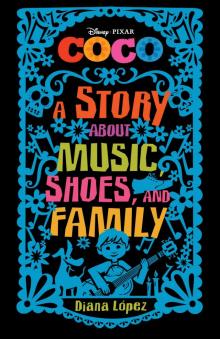 Coco Middle Grade Novel
Coco Middle Grade Novel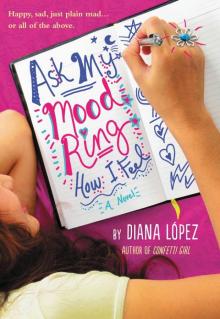 Ask My Mood Ring How I Feel
Ask My Mood Ring How I Feel Choke
Choke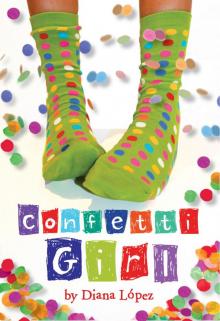 Confetti Girl
Confetti Girl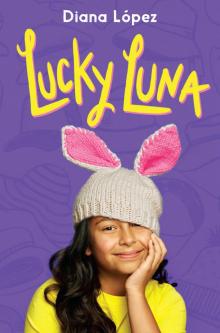 Lucky Luna
Lucky Luna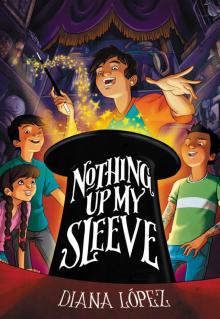 Nothing Up My Sleeve
Nothing Up My Sleeve